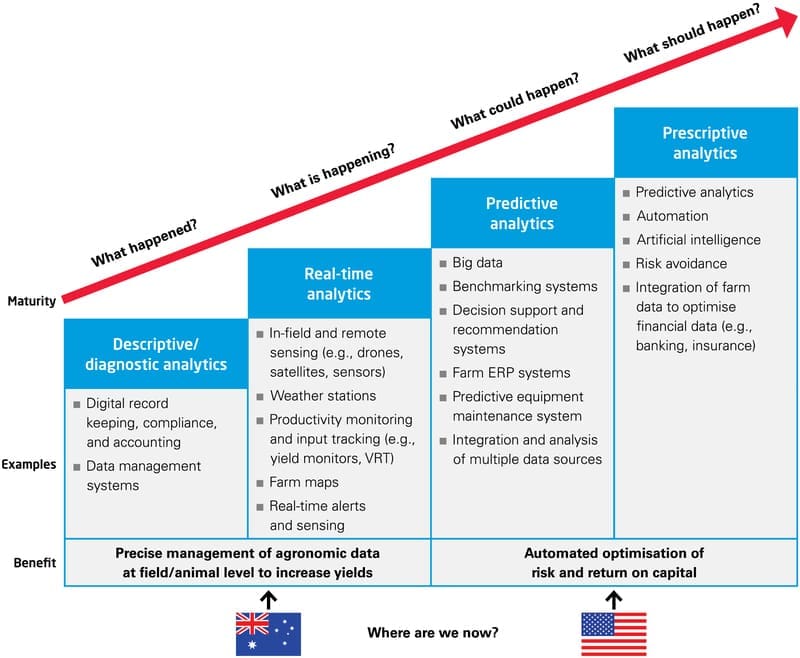AS THE least digitised industry sector in the world, agriculture is on the cusp of the next technological wave, with implications for investors, entrepreneurs, governments and farmers.
The United States is leading the way in the digitisation of agriculture, especially in terms of capital invested, with Australia still at a less advanced stage.
A new briefing paper prepared by the University of Sydney’s United States Studies Centre sets out the steps through which digital technologies are becoming integrated into agricultural production systems in Australia and the US.
Written by Sarah Nolet, a food systems innovation expert and CEO of global food and agriculture strategy firm AgThentic, the brief suggests Australia’s digital technologies sector will need to adapt to the current expectations and capabilities of Australian farmers and the realities of Australian agricultural environments.
“The application of increasingly advanced data analytics platforms – used to optimise on-farm production – in American agriculture has the potential to create a technological divide between farming in Australia and in the United States,” Ms Nolet says.
“Harnessing digital technologies to optimise Australia’s agricultural system will require entrepreneurs, the tech community and investors to work closely with the farming community who ultimately need to see a clear value proposition for their operations.”
Among the key points raised in the brief are that:
- The implementation of digital technologies in agriculture will be critical for Australia’s ability to meet growing global demands and remain competitive in global markets.
- In Australia, the current state of both development and adoption of digital agriculture technology is less mature than in the US; and is centred on single use-case solutions, enabled by descriptive and diagnostic analytics.
- Digital agriculture technology maturity culminates in the development and deployment of predictive and prescriptive data analytics platforms, and the US is a global leader in this field.

Agtech maturity model, with current Australian and US positions marked. Click on image for a larger view
Barriers to maturity in digital ag
Barriers exist in Australia that are limiting the development and the widespread diffusion of digital agriculture technologies, and therefore the maturation of the sector, the report found.
Capital is not the only factor required to bring digital technologies to farms, it suggests. Agriculture is a tough and uncertain environment, characterised by the unpredictability of natural systems, regulatory complexity, lack of standards and often a lack of enabling conditions such as internet connectivity, especially in remote locations.
To successfully move digital agricultural development and adoption up the maturity ladder and realise more value for all involved, the sector must overcome the disconnect that remains between the experience of farmers, the aspirations of digital agriculture entrepreneurs and the expectations of their investors. Barriers exist globally, including in the US, Australia and other developed countries.
Structural barriers
A key structural barrier constraining the maturity of digital agriculture in rural Australia is the lack of access to critical telecommunications and internet infrastructure.
A 2017 survey of 1000 producers across 17 agricultural industries in Australia found only one third (34pc) had mobile coverage across their entire property, while a little less than half (43pc) had no coverage at all. While 79pc of producers identified internet connectivity as important to their business, less than a third were satisfied with the performance of their office internet connectivity.
The lack of key datasets is also a barrier in some countries, including Australia. Foundational datasets for soil and climatic data have been critical to fostering the development of digital technologies in the US. However, similar national datasets do not exist in Australia. Technology developers and researchers are at a significant disadvantage without these datasets, the report found.
Familiarity and digital literacy barriers
Low levels of digital literacy prevent farmers from adopting digital technologies, no matter how useful they may be, the report found. Many producers are not digital natives and lack familiarity with digital and data-driven systems. This is an issue globally, as well as in Australia.
The average age of respondents to surveys conducted as part of the Australian P2D project was 57. As computers were not introduced to Australian schools until the mid-1980s, many survey respondents would not have had exposure to digital technologies in school.
An opportunity exists, therefore, to close this capability gap by training and deploying professionals who both understand agriculture and possess digital skills throughout the Australian agricultural sector to increase the adoption of digital agriculture technologies. Younger farmers, who are often digital natives, have an opportunity to take a leadership position with technology.
Value proposition of digital technologies
Australian farmers are keen on technology the report found – one in five are generally positive about digital technologies and report looking to focus their investment in farm technology and innovation in the next 12 months. However, the reality is only around one in twenty make that investment.
In some cases, the value proposition of digital technologies hasn’t outweighed the current, trusted options. In the results of a study conducted by Farmlogs, surveying more than 1000 growers in the US, more than 40pc of respondents still use spreadsheets to track expenses, 28pc use pen and paper, and 2.8pc don’t track expenses at all.
Another challenge is that producers who have adopted new technologies have not seen the purported benefits. A Rabobank study of 1000 farmers across Australia found less than a quarter were using sensor technologies with only a subset (9.2pc of the overall study sample) identifying an improvement in profitability from the use of this technology.
Finally, even for technologies with a strong value proposition, such as automated harvesting that can cut labour costs, digital technologies may not yet be mature enough to deliver benefits to farmers in complex and uncertain agricultural conditions. Global AgTech market research firm Alpha Brown conducted research on the potential market for robotic harvesting solutions. Of 1300 farmers and growers, only 3pc involved in the research are using harvesting robots.
“As these studies suggest, a lack of a strong value proposition for farmers is a critical barrier to the adoption of currently available digital technologies, as well as to the maturation of the digital agriculture technologies sector,” the report found.
“Farmers need to see a clear value proposition to digital technologies before they will adopt, whether point solutions or platforms.
“That’s not to say farmers are not innovative or keen adopters of technology — quite the opposite. Farmers have proven for generations that they will adopt technologies that add value.
“However, the value propositions that start-ups and investors are so excited about are often not consistent with the realities of agriculture and the needs of farmers.
“Fully autonomous farming operations managed by swarms of intelligent robots, sounds exciting, but faced with the reality of drought, poor on-farm connectivity and the day-to-day grind, it is much the same as suggesting to the average consumer that we will all soon be migrating to Jupiter. We’re just not there yet.”
Overcoming these barriers by bridging the disconnect of expectations between Australian farmers and the technology community, and creating solutions with strong value propositions, requires investors and entrepreneurs to understand the many complexities faced by Australian farmers, the report suggests.
Click here to access the full report


HAVE YOUR SAY